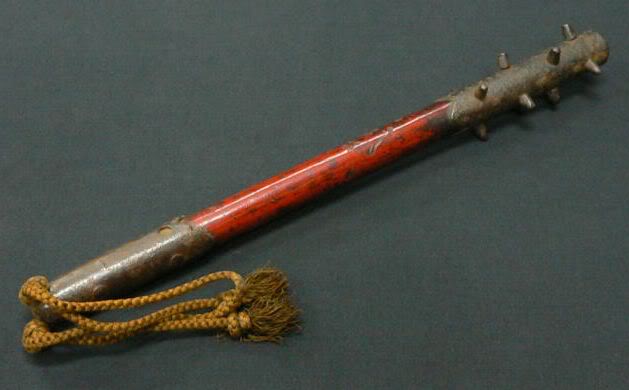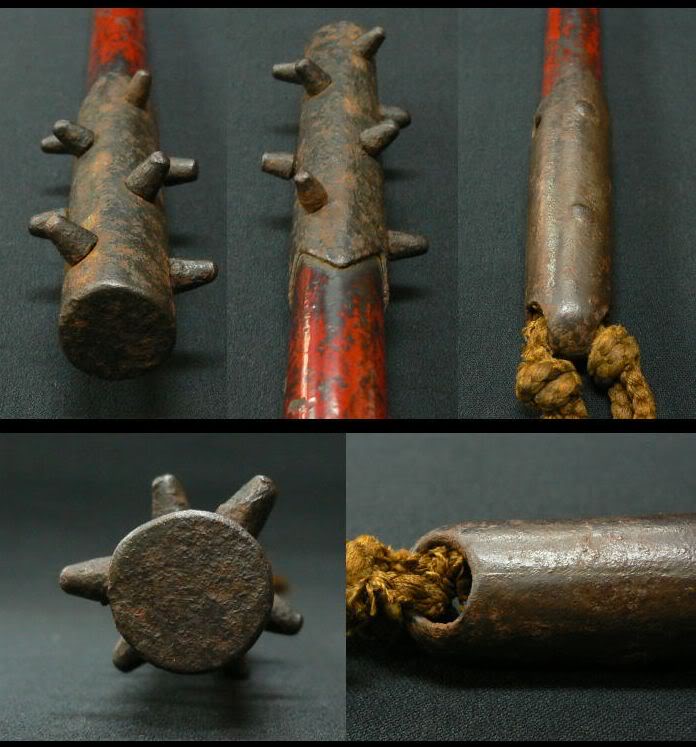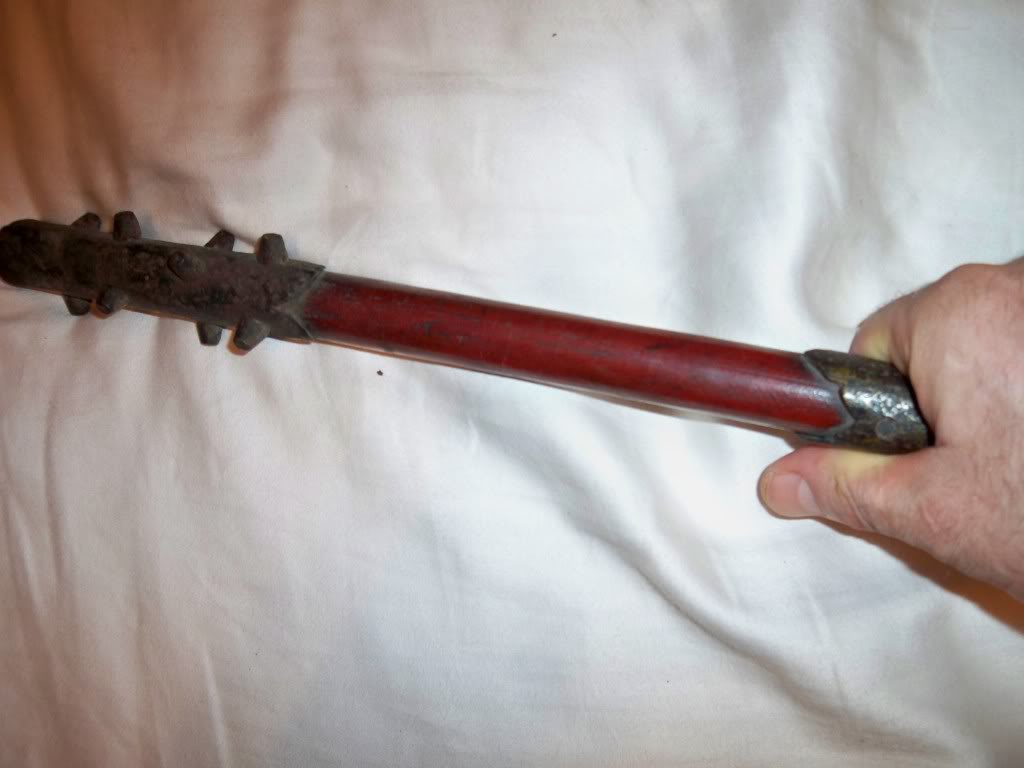| Author |
Message |
|
Chase Bolling
Location: United States Joined: 15 Jun 2012
Posts: 20
|
 Posted: Thu 21 Jun, 2012 4:01 pm Post subject: How lethal were one handed maces and hammers? Posted: Thu 21 Jun, 2012 4:01 pm Post subject: How lethal were one handed maces and hammers? |
 |
|
|
Were the one handed maces and war hammers likely to be fatal or would you have to pound a little bit?
|
|
  |
 |
Cole B

|
 Posted: Thu 21 Jun, 2012 4:25 pm Post subject: Posted: Thu 21 Jun, 2012 4:25 pm Post subject: |
 |
|
|
Depends entirely on where you hit and what kind of protection they were wearing.
|
|
  |
 |
|
Chase Bolling
Location: United States Joined: 15 Jun 2012
Posts: 20
|
 Posted: Thu 21 Jun, 2012 4:28 pm Post subject: Posted: Thu 21 Jun, 2012 4:28 pm Post subject: |
 |
|
|
Preferably the head and neck area.
|
|
  |
 |
|
Paul E.G
Location: New Jersey, USA Joined: 13 Apr 2010
Posts: 8
|
 Posted: Thu 21 Jun, 2012 5:02 pm Post subject: Posted: Thu 21 Jun, 2012 5:02 pm Post subject: |
 |
|
Here is a link to a picture depicting a skull from the battle of Towton, supposedly damaged by a poleaxe or some blunt instrument. Type in "battle of Towton" and "skulls" into a search engine and you'll find a whole bunch of pictures showing more of the damage inflicted by all kinds of weapons on the skulls that were exhumed. It's pretty cool.  I hope this helps answer your question. I hope this helps answer your question.  I'm sure there's tests that have been done where people have tested maces, warhammers, and poleaxes against armor. I'm sure there's tests that have been done where people have tested maces, warhammers, and poleaxes against armor.
[/url]http://ars.els-cdn.com/content/image/1-s2.0-S0305440303000190-gr3.jpg[url]
There's also plenty of demonstrations people have made on youtube of people testing warhammers on smashing things and depending on which end you use, piercing things too. Do you want me to post some?
|
|
  |
 |
|
Chase Bolling
Location: United States Joined: 15 Jun 2012
Posts: 20
|
 Posted: Thu 21 Jun, 2012 5:04 pm Post subject: Posted: Thu 21 Jun, 2012 5:04 pm Post subject: |
 |
|
|
Yes please...I would love some visuals on the effectiveness of these weapons.
|
|
  |
 |
Chad Arnow
myArmoury Team


|
|
    |
 |
|
Gregg Sobocinski
|
 Posted: Fri 22 Jun, 2012 8:12 am Post subject: Posted: Fri 22 Jun, 2012 8:12 am Post subject: |
 |
|
I figured that the point of maces and pole hammers is not so much the damage you can see, but the damage you can't see. Once your opponent is concussed, or has broken bones under his mail or armor, he becomes easy pickings for more leisurely dispatching.
The most serious brain injuries in an emergency room come with little blood. Baseball bat beatings are usually more damaging to the brain than a single-impact auto accident.
|
|
  |
 |
|
Chase Bolling
Location: United States Joined: 15 Jun 2012
Posts: 20
|
 Posted: Fri 22 Jun, 2012 8:34 am Post subject: Posted: Fri 22 Jun, 2012 8:34 am Post subject: |
 |
|
|
Was it possible to kill with the mace through a good steel helmet?
|
|
  |
 |
|
Eric Allen
|
 Posted: Fri 22 Jun, 2012 9:42 am Post subject: Posted: Fri 22 Jun, 2012 9:42 am Post subject: |
 |
|
| Chase Bolling wrote: | | Was it possible to kill with the mace through a good steel helmet? |
Perhaps. Depends on the helmet and the nature of the blow.
Surviving a blow to the head is part of why you wear a helmet in the first place, and why they have suspension liners and/or padding. All that plus the material of the helmet itself and the steel's ability of flex, dent, and deform even just a bit helps to distribute the force of the blow.
But, a good, solid blow with a club-like object? You could certainly knock them unconscious and rattle their brain around inside their skull. Depending on the design of the helmet, there could be more direct trauma. Depending on how you hit, you might even have a good chance of causing neck injury.
[mythbusters] I'm going to call this one 'plausible' [/mythbusters]
|
|
  |
 |
Steve Shimmer

Location: Wickford, England Joined: 03 Jun 2012
Posts: 14
|
 Posted: Fri 22 Jun, 2012 10:19 am Post subject: Posted: Fri 22 Jun, 2012 10:19 am Post subject: |
 |
|
| Chase Bolling wrote: | | Was it possible to kill with the mace through a good steel helmet? |
As I understand it, amongst knights the general idea was to capture opponents for ransom, not kill them outright, so the mace may be been employed to knock someone out.
Of course, it's possible to kill someone even if you're just trying to knock them out.
|
|
   |
 |
Benjamin H. Abbott

|
 Posted: Fri 22 Jun, 2012 2:06 pm Post subject: Posted: Fri 22 Jun, 2012 2:06 pm Post subject: |
 |
|
|
As a general rule, bludgeoning instruments require much more energy to inflict fatal wounds than edged weapons. Apart from blows to the head or spine, mace and hammers aren't likely to kill. Single-handed ones could knock unconscious through a helmet and break limbs - at least from horseback - but that's about the extent of their effectiveness.
|
|
  |
 |
|
William P
|
 Posted: Fri 22 Jun, 2012 10:10 pm Post subject: Posted: Fri 22 Jun, 2012 10:10 pm Post subject: |
 |
|
well another aspect of a mace and warhammers effectiveness that swords couldnt match was the ability to be a spanner in the gears to an opponents armour.
as we all know a plate harness relied on all the pieces being able to move smoothly in order to allow proper movement, imagine you hit a section of lames say on the shoulder, hit one it dents, maybe not by much but all of a sudden that limb has seized up big time and good luck moving enough to fight.
whack a visor, itll dent and he cant remove it in fact there are numerous references to knights at tournements having to have their helm whacked by a blacksmiths hammer in order to be taken off again when a lance strick dented the helmet in such a way he couldnt take it back off.
if a visor cant be lifted a man is in serious trouble of being flanked and double teamed, if his finger lames are hit maybe he cant let go/ grab his other weapon.
and later armets had a series of gorget plates and it often attached to the gorge plates via a special 'ring' hard to explain bu essenially the more complex the armour is, the easier it is to cripple it,
|
|
   |
 |
Eric S

|
 Posted: Sat 23 Jun, 2012 9:02 pm Post subject: Posted: Sat 23 Jun, 2012 9:02 pm Post subject: |
 |
|
Here is the Japanese one handed mace (ararebo), it would not seem to have been very effective against the Japanese helmet which were usually quite thick but it was meant for some particular type of attack, any ideas?




|
|
   |
 |
|
Timo Nieminen
|
 Posted: Sat 23 Jun, 2012 9:20 pm Post subject: Posted: Sat 23 Jun, 2012 9:20 pm Post subject: |
 |
|
| Eric S wrote: | | Here is the Japanese one handed mace (ararebo), it would not seem to have been very effective against the Japanese helmet which were usually quite thick but it was meant for some particular type of attack, any ideas? |
At first glance, this looks like a likely police weapon. On second glance, it's quite rare; too rare I think to have been a police weapon. "Secret" martial artist's weapon? Basically, a police truncheon that's also good for reaching out and snagging swords. According to Mol, it appears during Edo Period.
"In addition to being efficient, all pole arms were quite nice to look at." - Cherney Berg, A hideous history of weapons, Collier 1963.
|
|
   |
 |
|
Graham Shearlaw
|
 Posted: Sun 24 Jun, 2012 1:42 am Post subject: Posted: Sun 24 Jun, 2012 1:42 am Post subject: |
 |
|
"Secret" martial artist's weapon?, well it is a spiked club
the lumps should concentrate the impact to a small spot a bit it was a great skull cracker
it looks like a great weapon to have for self defense small and less look im a weapon than a sword.
like the spiked club it is a great weapon in a street fight/riot/mugging but once armor turns up
|
|
  |
 |
|
William P
|
 Posted: Sun 24 Jun, 2012 6:43 am Post subject: Posted: Sun 24 Jun, 2012 6:43 am Post subject: |
 |
|
the standard police weapon was a jute in mainland japan and the sai in okinawan islands,
this mace is pretty short 15 inches is pretty small for a mace i mean putting it into perspective, daggers aka tanto are classified as having blade lengths 12 inches or less (or thereabouts) so i think im going to agree with the self defense explanation,
and the mace being unable to cave in a helmet matters very little if it can easily smash the rest of your body. and just because it cant cave in a helmet doesnt mean the impact wont give you a severe concussion/ whiplash
also eric, as im sure your aware, most japanese armour wasn exactly very plate dense at the best of times, limbs were often of plate and maile particularly older armours, so if that thing cracks you on the wrist, youll break the bones no problem.
also mempo werent always full face masks, even if they were, that mace smacking your mask in the face will send you reeling,
although this one in particular looks alitle short to be teribly useful if it was carried on the battlefield id say that one might carry it as an alternative to the tanto,
eric, what periods are these ararebo dated to? edo period or maybe even earlier?
|
|
   |
 |
Eric S

|
 Posted: Sun 24 Jun, 2012 6:56 am Post subject: Posted: Sun 24 Jun, 2012 6:56 am Post subject: |
 |
|
| Timo Nieminen wrote: | | it's quite rare; too rare I think to have been a police weapon. "Secret" martial artist's weapon? Basically, a police truncheon that's also good for reaching out and snagging swords. According to Mol, it appears during Edo Period. |
Timo, the "Edo period" covers a lot of ground (1603-1868) as you know, it is a sort of catch all time period, a way of saying "I am not sure exactly". I have found that when it comes to Japanese/samurai armor and weapons "rare" does not necessarily mean not common, it could just mean that there are many more in collections and none or in the case of the ararebo only 2 known and available with public images or that previously it was just not studied or researched in the west but is known in Japan. Or it could have be rare and only custom made for a few individuals as a side weapon for some now unknown purpose, either way a lot of work went in them. Maybe someone here knows of a similar European weapon.
|
|
   |
 |
|
Timo Nieminen
|
 Posted: Sun 24 Jun, 2012 8:04 pm Post subject: Posted: Sun 24 Jun, 2012 8:04 pm Post subject: |
 |
|
| William P wrote: | | the standard police weapon was a jute in mainland japan and the sai in okinawan islands, |
Jutte/jitte was the most characteristic Japanese police weapon, serving as a badge of office as well as a truncheon. But there was a pretty diverse range of Japanese police weapons. Don Cunningham's Taiho-Jutsu is a good source for Edo-period Japanese policing and police weapons.
| Eric S wrote: | | Timo Nieminen wrote: | | it's quite rare; too rare I think to have been a police weapon. "Secret" martial artist's weapon? Basically, a police truncheon that's also good for reaching out and snagging swords. According to Mol, it appears during Edo Period. |
Timo, the "Edo period" covers a lot of ground (1603-1868) as you know, it is a sort of catch all time period, a way of saying "I am not sure exactly". I have found that when it comes to Japanese/samurai armor and weapons "rare" does not necessarily mean not common, it could just mean that there are many more in collections and none or in the case of the ararebo only 2 known and available with public images or that previously it was just not studied or researched in the west but is known in Japan. Or it could have be rare and only custom made for a few individuals as a side weapon for some now unknown purpose, either way a lot of work went in them. Maybe someone here knows of a similar European weapon. |
Common enough to have a standard name, and be listed in books of exotic Japanese weapons. Rare enough to be considered rare.
Some stuff is assigned to Edo Period because it's a conservative choice - not known to be older than Edo Period, so call it Edo Period. Sometimes, it's supposedly invented during the Edo Period according to documentary evidence. Which Mol uses to say Edo, I don't know (it's in this book by Mol).
Do you know any weights for antique ararebo? Modern replicas look to be about 1.5 pounds, but they might use thicker steel for the metal sleeve on the head, and be a bit larger, overall.
"In addition to being efficient, all pole arms were quite nice to look at." - Cherney Berg, A hideous history of weapons, Collier 1963.
|
|
   |
 |
|
William P
|
 Posted: Sun 24 Jun, 2012 10:23 pm Post subject: Posted: Sun 24 Jun, 2012 10:23 pm Post subject: |
 |
|
ok my 2 cents on the mace itself
erics mace is 15 inches, by comparison most replica maces from manning imperial lutels and A&A seem to hover around the 24 inch mark, but can range from 20 inches to 28 inches in the case of a coupla maces from lutels.
and all steel gothic maces seem to hover around he 22-24 inch mark.
im hinking is the lack of leverage and momentum hat would be the problem, not he lack of weight.
as for policemans weapons, i know his much,
mos popular depictions o late edo/ meiji era street policemen (aka he 'bobbies' ) seem o have he quarterstaff as their standad tool
more specialised man catchin implements included bu wernt limited to the soegarami, tsukobo and sasumata although hese three were mostly pole weapons for keeping people at a distance, and i get the feeling that the 'dont let him get close' mentality is why the street police had the Bo and not shorter truncheons.
|
|
   |
 |
Eric S

|
 Posted: Mon 25 Jun, 2012 2:33 am Post subject: Posted: Mon 25 Jun, 2012 2:33 am Post subject: |
 |
|
Timo, I can probably find out the weight of an ararebo, it may take some time but I will post it when I find out.
As for age, it is sometimes incredibly hard to definitely pin down the age on Japanese items, unless you find a reference to a certain item in a period picture, print, or book it can be just guess work based partially on the methods and materials used in the construction.
One other thing I notice is that despite some weapons and armor being quite well known actual images of authentic items can be very rare, take the sai, very well known and copied but how many antique sai do you see for sale? Real antique sai almost never come up for sale and images are very rare also. Try to find an antique nagamaki or odachi, same thing with kanabo, aribo, kanemuchi, or any number of weapons that should be much more common.
I watch auctions in Japan for antique weapons and armor, also ebay and dealers, the most common Japanese weapon being sold besides swords are jutte, there is no lack of jutte, in any week there are any number of antique jutte for sale, were they that much more common then other weapons? Were all the other weapons went is a mystery but I know that many collectors never post photographs of their collections.
As for the ararebo, I was thinking that possibly they were for use on horseback, a lightweight weapon that would not throw the user off balance, it could be hung on a belt or saddle, good for bashing people that came too close.
|
|
   |
 |
|
|
You cannot post new topics in this forum
You cannot reply to topics in this forum
You cannot edit your posts in this forum
You cannot delete your posts in this forum
You cannot vote in polls in this forum
You cannot attach files in this forum
You can download files in this forum
|
All contents © Copyright 2003-2025 myArmoury.com — All rights reserved
Discussion forums powered by phpBB © The phpBB Group
Switch to the Basic Low-bandwidth Version of the forum
|

